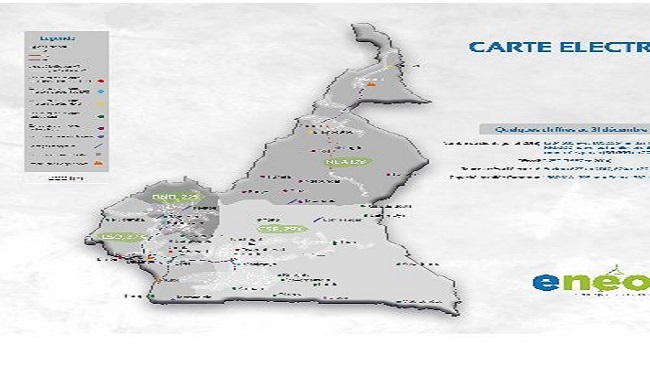CPDM crime syndicate disputes CFA186bn debt claimed by Eneo
The Cameroonian government is not ready to pay the CFA186 billion in debt claimed by the national electricity company Eneo. The state believes that the amount owed to the company is less than what is claimed.
The Cameroonian power utility Eneo has taken stock of its debtors and found that the Cameroonian government still owes it CFA186 billion. This amount includes the debt of the state itself and all public entities.
Actis, which owns 51% of Eneo, sent a letter on April 14 to Prime Minister Joseph Dion Ngute reminding the government, which also owns 44% of Eneo, that it has until April 28 to pay the debt. However, the letter has not been validated by the government, which disputes the amount. A meeting was held between the parties at the Ministry of Water and Energy to discuss the issue. The government said it had already spent CFA269 billion to clear part of the debt for 2020, 2021 and 2022, and that CFA42 billion had been paid in Q1 2023. The remaining amount should therefore be much less than CFA186 billion, the government said. Another meeting was held yesterday at the Ministry of Finance.
Rate subsidy and street lighting
A source who partook in the April 25 meeting revealed that the government mainly disagrees with two points: the tariff compensation (a subsidy to the consumer borne by the state, representing the difference between what the consumer should pay and what they actually pay) and public lighting. According to our source, on these two points, Eneo requests respectively CFA72 billion and CFA57 billion for the 2020-23 period.
However, referring to the MoU on the partial settlement of the State’s debt to Eneo, the government said the tariff compensations for 2020, 2021 and 2022 have been fully settled. The payment of the tariff compensation for 2023 is already discussed between Eneo, Electricity Development Corporation (EDC) and the Electricity Sector Regulation Agency (Arsel). The bills for public lighting have still not been validated by Arsel and therefore cannot constitute a debt, the government said.
According to the December 15, 2021 debt payment MoU consulted by Business in Cameroon, CFA14 billion have been paid under the “tariff subsidy 2021” and CFA27 billion under “advance on tariff subsidy 2022”. The December 2, 2022 MoU revealed that CFA26.99 billion have been paid for “the balance of the 2022 subsidy”. About the public lighting bills, a payment of CFA12 billion is reported in the December 15, 2021 MoU between Eneo and the government, but the period to which this payment corresponds is not specified.
Double billing
When contacted, the general management of Eneo did not wish to answer our questions. The letters sent to authorities by the company suggest that bills for public lightning have long been the subject of disagreements between the two parties. In a letter sent to the Minister of Water and Energy, Gaston Eloundou Essomba, on April 4, 2023, Eneo’s Managing Director, Patrick Eeckelers, stated that “Eneo has not received any validation (or payment) – even partial – of the public lighting consumption of the decentralized local authorities for 2022 (CFA22 billion). In a letter sent to the Prime Minister on November 12, 2021, the then MD, Eric Mansuy, estimated that “public lighting consumption not yet recognized” was CFA30 billion.
Another source close to the matter reported that during the April 25 meeting, the parties found that “some debts already paid or in the process of being paid by decentralized local authorities, universities, hospitals and public enterprises were still labeled as debt”. Also, “a public company like Camwater only recognizes CFA15.5 billion out of the CFA21.4 billion claimed by Eneo,” the source said.
Sustainable solutions
“This situation is now a problem only because the State and its entities do not pay their bills regularly,” comments a sector player. According to Actis, the late payments also destabilize the financial balance of the sector. According to an internal source, Eneo collects an average of CFA27 billion each month “excluding payments from the State”. However, the company says it has “critical” monthly expenses of CFA34 billion (salaries, taxes, electricity and fuel purchases, water rights, transport charges, and bills from other suppliers and subcontractors). These can reach CFA38 billion when the thermal power plants are under particular pressure, as was the case in 2021, when the Lagdo hydroelectric plant was at its lowest output.
According to Actis, a sustainable solution to avoid such problems in the future is for the government and its entities to pay their bills monthly. Agreeing with this comment, the state committed to paying CFA1 billion each week to cover its electricity consumption and took the occasion to call on the power provider to improve its quality of service. However, fulfilling this commitment seems hard. Over the first four months of 2023, the state paid CFA10 billion instead of CFA16 billion. Furthermore, the state-owned aluminum producer Alucam, which was supposed to pay CFA1.3 billion each month, has not paid its bills for at least six months. The water company Camwater, paid CFA200 million instead of CFA750 million.
Source: Business in Cameroon





